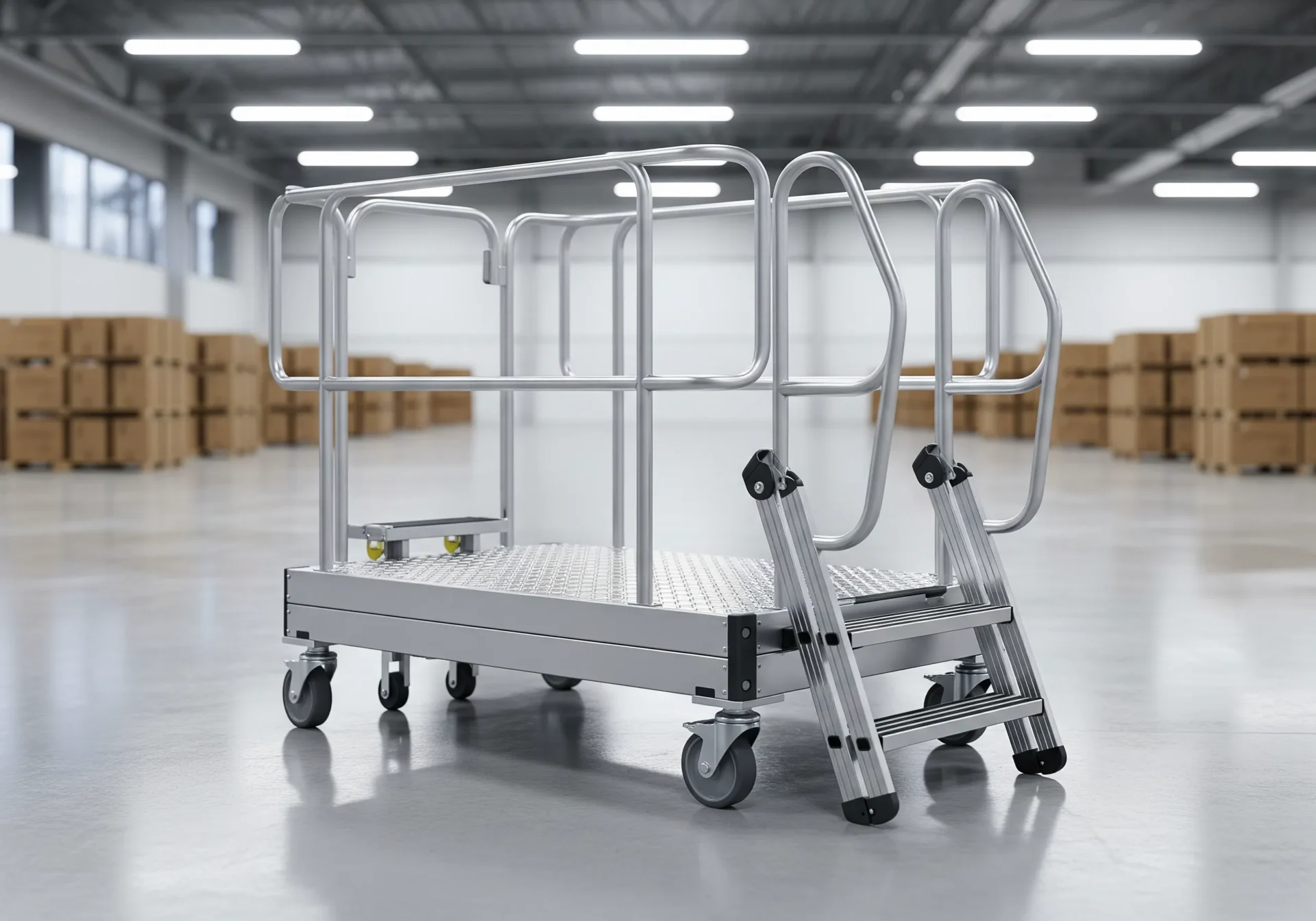Introduction
Mobile work platforms and rolling steps used in manufacturing, warehousing, and construction sites enhance work efficiency but also carry risks such as falls and tumbles. The U.S. Occupational Safety and Health Administration (OSHA) regulation 1910.23(e) specifies detailed safety design and usage methods for this equipment, clearly defining requirements for step width, load capacity, handrail height, and stabilization measures. This article outlines the key points for legal compliance and offers a practical perspective on achieving both on-site safety and productivity.
Issues and Background
Scope of Application and Related Standards of OSHA 1910.23(e)
OSHA 1910.23(e) targets mobile ladder stands and mobile ladder stand platforms, detailing their design and usage conditions. Exclusions from its application include equipment for emergency use only and scaffolding that is an integral part of a machine. Furthermore, related standards include 1910.21 for definitions of terms and loads, 1910.28 for the duty to have fall protection, and 1910.29 for fall protection system criteria. Source: OSHA 1910.23 – Ladders
Violation Risks and Accident Trends
On-site, typical violations include a lack of non-slip finishes, the use of products that do not meet the designed load capacity, and exceeding maximum height limits. If non-compliance is found during an OSHA inspection, it can result in heavy fines, corrective action orders, and in some cases, has been reported to lead to a suspension of operations. Source: OSHA Standard Interpretations
Product and Service Introduction
Detailed Explanation of OSHA Requirements and Specifications
OSHA 1910.23(e) requires that the step width of mobile work platforms be at least 16 inches (41 cm) and that treads have a non-slip finish. The load capacity must be at least four times the maximum intended load, and the wheels and casters must also meet this same requirement. For heights of 4 feet (1.2 m) or more, handrails of 29.5 to 37 inches (75 to 94 cm) must be installed, though chains or similar items may be substituted for special-purpose applications. Additionally, for heights exceeding four times the base dimension, stabilization measures such as outriggers or counterweights are mandatory. Source: UpCodes – Mobile Ladder Stands and Platforms
On-site Compliance Case Studies (Before → Action → After)
- Warehousing: Switched from older platforms exceeding height limits to OSHA-compliant models, improving inspection pass rates.
- Manufacturing: Updated to a new design with tread depth and slope angle within standards, simultaneously improving work efficiency and safety.
Hasegawa’s Reliability
Design and Testing in Compliance with U.S. Standards
Hasegawa conducts tests based on OSHA and ANSI standards, including load tests to withstand more than four times the maximum intended load, tread abrasion tests simulating long-term use, and topple stability tests involving shifts in the center of gravity and the application of external forces. As a result, they have a track record of supplying dual-compliant ANSI/OSHA models that are highly regarded in the U.S. market. Source: ANSI A14.7 Ladder Standards
Responsiveness to On-site Feedback
They design and manufacture special-purpose gate and chain specifications, reflecting requests from customer sites. Furthermore, as part of their support for compliance with overseas standards, they also provide necessary technical documents and certificates to assist with post-installation legal conformity.
Conclusion
Compliance with OSHA 1910.23(e) is an essential condition for operating mobile work platforms and rolling steps safely and efficiently. By meeting the requirements discussed in this article, such as those for step width, load capacity, handrail height, and stabilization measures, you can improve work efficiency while avoiding the risks of legal violations. When selecting products, it is important to consider both standard compliance and on-site needs, and to also refer to the latest information from official OSHA, ANSI, and ISO standards. Source: OSHA Official Website

